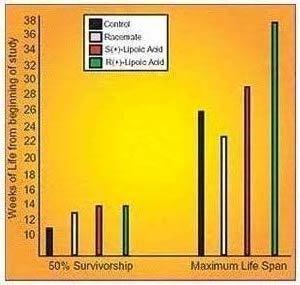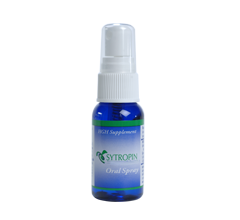 The advantage of using an accelerated model of aging is that their short lifespans allow researchers to get quick results, especially when funding is tight. But the disadvantages can be serious, too. When the results come in, it's hard to ever be sure what the final result means, because there's no totally failsafe way to tell what parts of the results are due to a therapy's effects of aging, and which are due to the therapy's effects on the disease which makes the animals so short-lived to begin with. But with that understanding, let's have a look at the study.
The advantage of using an accelerated model of aging is that their short lifespans allow researchers to get quick results, especially when funding is tight. But the disadvantages can be serious, too. When the results come in, it's hard to ever be sure what the final result means, because there's no totally failsafe way to tell what parts of the results are due to a therapy's effects of aging, and which are due to the therapy's effects on the disease which makes the animals so short-lived to begin with. But with that understanding, let's have a look at the study.
The scientists fed the animals either a basic lab animal diet, or one supplemented with equal doses of one of the three forms of lipoic acid, starting from the time they were ten weeks old and continuing for the rest of their lives. 119
The time it took for half of the animals in each group to die was not changed by any form of lipoic acid, suggesting that none of the supplements had any effect on simple things like short-term vulnerability to an infection or parasite. But among the animals who made it past the halfway point, a dramatic difference emerged.
Animals whose diets were supplemented with the racemic compound lived no longer than they would have if they had just received the basic, unsupplemented diet - if anything, they might have lived lives that were a little shorter, although the difference was not strong enough to rule out a simple statistical fluke. Similarly, the animals who got the S(-)-enantiomer seemed to live a little longer than the unsupplemented animals - but, again, not long enough for the difference to be a statistically meaningful result. In short, neither the racemate form of lipoic acid you get in common supplements, nor straight S(-)-lipoic acid, seems to have done anything important to these animals, for better or for worse. They may as well have been eating regular lab chow.
But now have a look at the results in the animals who were given access to a diet enriched in R(+)-Lipoic Acid. Here, the results were undeniable. The longest-lived animals in this group lived dramatically longer lives than those in anyother cohort. In fact, the mice with supplemental R(+)-Lipoic Acid in their diets exceeded, by a wide margin, the maximum lifespan of animals left to live out their normal lives (Figure 9 ). Animals in the other groups averaged a maximum lifespan of 36 weeks (26 weeks from the beginning of the study), versus a maximum lifespan of 48 weeks for the R(+)-Lipoic Acid group!
And these were realistic doses of the supplement, too. The researchers fed the animals supplements at a concentration which, in a human, would only be about 630 mg - not at all out of line with what human users are taking. In fact, these scientists also tried out some considerably higher doses of lipoic acid in their study, but interestingly, they had no effect on lifespan - with the bizarre exception that, at extremely high dosages, the racemic compound actually shortened the animals' lifespan to a maximum of ten weeks.
It's also important to note that the animals' weights did not differ significantly by group - so we can rule out the effects of "hidden" caloric restriction in these results. That is, if something about the lipoic acid supplements in the diet had caused the animals eat less food, the resulting caloric restriction might have slowed aging, and the anti-aging effect of R(+)-Lipoic Acid would actually be due to nothing more than appetite suppression. But the close similarity of the animals' weights rules out that kind of mistake.
Still, some caution is in order. The use of the NMRI mouse means that the researchers got fast results … but it's hard to say for sure what those results mean. The obvious reading is that that the core processes of aging are dramatically slowed by R(+)-Lipoic Acid - and not by the racemate or by the S(-)-enantiomer. But even the longest-lived of these mice still lived a short life, compared to a normal mouse given nothing but regular lab chow. So we can't rule out with certainty the possibility that the supplement merely protected them against some aspect of their unusual genetics.
Will R(+)-Lipoic Acid live up to its full promise? Can it truly step in to stop the slow, steady sinking into oblivion we all face with age? Will R(+)-Lipoic Acid extend maximum lifespan? Does R(+)-Lipoic Acid slow down the aging process itself? Are users of R(+)-Lipoic Acid sipping from the Fountain of Youth?!
These are crucial questions. It's a little giddying to even ask them. And as we'll see, answers will not be long in coming. But in the meantime, we can shortly expect to hear results from another lifespan experiment - an experiment with a fatal flaw.
Learn More About Experiment Highlights
Please consult with a health care professional before starting any supplementation program. The information contained on this site is general in nature and Company does not take any responsibility for any errors that may appear. Company has made every attempt to make the information as accurate as possible. However, Company does not warrant its accuracy. Please note that the statements on this web site have not been evaluated by the FDA.








 The advantage of using an accelerated model of aging is that their short lifespans allow researchers to get quick results, especially when funding is tight. But the disadvantages can be serious, too. When the results come in, it's hard to ever be sure what the final result means, because there's no totally failsafe way to tell what parts of the results are due to a therapy's effects of aging, and which are due to the therapy's effects on the disease which makes the animals so short-lived to begin with. But with that understanding, let's have a look at the study.
The advantage of using an accelerated model of aging is that their short lifespans allow researchers to get quick results, especially when funding is tight. But the disadvantages can be serious, too. When the results come in, it's hard to ever be sure what the final result means, because there's no totally failsafe way to tell what parts of the results are due to a therapy's effects of aging, and which are due to the therapy's effects on the disease which makes the animals so short-lived to begin with. But with that understanding, let's have a look at the study.